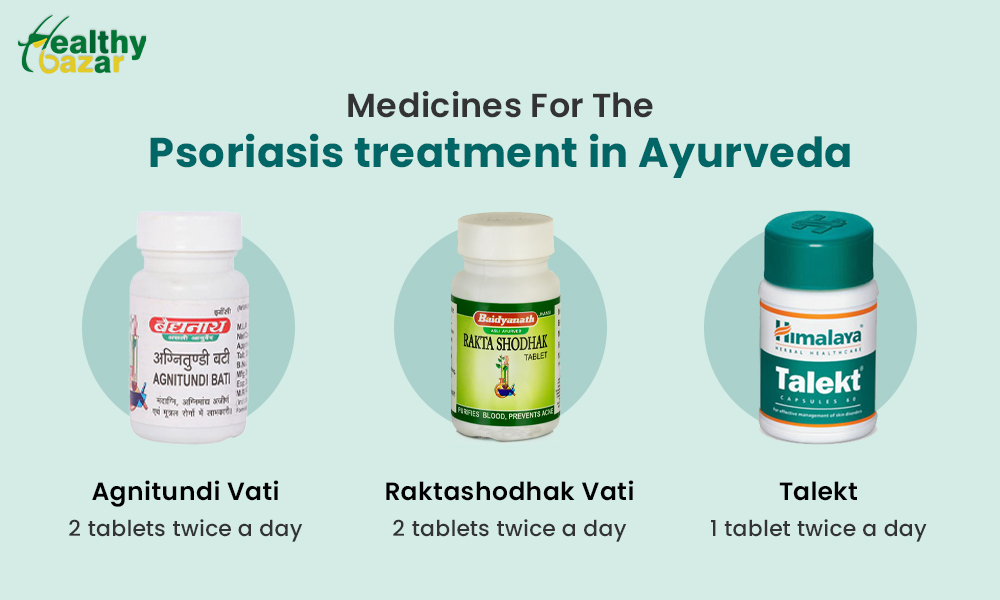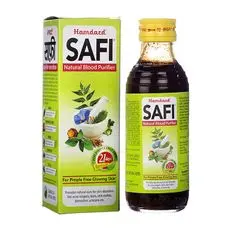 Where should we deliver your order?
Where should we deliver your order?Psoriasis: Causes, Triggers, Treatment in Ayurveda and More

Psoriasis is a non-contagious autoimmune disease, a widespread problem, and millions worldwide suffer from it. Due to its recurrent nature, this disease has remained a major problem. It is considered an incurable, chronic inflammatory skin disease and can impact the quality of life. But Psoriasis treatment in Ayurveda can help in rapid and significant recovery.
Psoriasis originates from the Greek word 'Psora' meaning 'itching', and 'sis' meaning 'acting condition'. It exhibits abnormal redness of the skin & plaques, which are itchy or painful patches covered with thick, dry, discolored, and scaly skin.
The excessively rapid multiplication of skin cells is a reason for these dry, silvery-white skin scales. A faulty inflammatory response produced by white blood cells called T-cells triggers the increased number of faulty skin cells. According to experts, Psoriasis affects up to 1% of the world's total population, both male and female populations suffering equally.
Although this skin ailment can affect any part of the body, Psoriatic plaques most commonly occur on the elbows, knees, scalp, back, face, palms, and feet. This skin condition is not permanent, but at the same time, it is not usual for it to resolve immediately.
Signs and Symptoms of Psoriasis
Psoriasis plaques can range from flaky scaling to large eruptions. This skin disease can go undetected in its initial occurrence or during earlier stages. The symptoms and appearance of the disease vary depending on the type and severity. Some common signs and symptoms:
- Over 65% of patients complain of itching.
- Dry, thin, silvery-white scales variable in amount and thickness, patients may report that their disease worsens in the winter and improves in the summers.
- Plaques of red skin are often covered with loose, silver scales, the most common symptom associated with Psoriasis. Such plaques can be extensive, itchy, and painful.
- Some cracking and bleeding may also occur. In the most critical cases, these patches mingle with one another, covering the entire surface areas of the skin.
- Irritating patches of skin and dots, which are raised and thick, can range from pink-red to red colour.
- Change and disfiguration of nails can appear. For example, one can see thickening, yellow-brown spots, dents, and pits on the nail surface, detachment of the nail from its base, and breaking of the actual nail may occur.
- Plaques of silver scales or crust may develop on the scalp as loose dandruff flakes are constantly shed.
Causes of Psoriasis
The exact cause of Psoriasis remains unknown. A combination of elements, including genetic predisposition and environmental circumstances, are involved. Defects in the immune system and inflammation control also play an important role in causing this skin disease.
Following are the reasons for Psoriasis:
- Dietary Factors
Diet has been suggested to play a role in the etiology and pathogenesis of Psoriasis. It has been observed that Psoriasis improved in 60% of the patients who changed their dietary habits. In addition, some studies showcased that fasting, low-energy diets, and healthy vegetarian intakes improved its symptoms.
- Environmental Factors
Environmental trigger factors can be a mechanical injury, ultraviolet & chemical injury, various infections, prescription drug use, psychological stress, smoking, etc. The most compelling of these is infection with the group Streptococci. Streptococcal throat infections frequently lead to outbreaks of Guttate Psoriasis, which can further point towards chronic plaque Psoriasis.
- Genetic Factors
Research studies have established the genetic components in Psoriasis. There is a clear genetic background, as there were many such incidences amongst first- and second-degree relatives of patients with prior Psoriasis history.
- Immunologic Factors
Psoriasis is an autoimmune disease and Psoriatic lesions are associated with enhanced movement of T cells in the underlying surface of the skin.

Psoriasis Triggers
Several people predisposed to Psoriasis may be symptom-free for years until a factor triggers the disease. Common triggers for Psoriasis are:
- Infections, such as strep throat or skin infections
- The weather, especially cold, dry conditions
- Skin injuries, such as a cut or scrape, insect bite, or severe sunburn
- Stress
- Smoking or second-hand smoke
- Alcohol consumption
- Certain medications - including lithium, high blood pressure medications, and antimalarial.
- Rapid discontinuation of oral or systemic corticosteroids.
Ayurveda and Psoriasis
In Ayurveda, the management of all skin diseases is grouped under a broad heading of Kushtha Roga. Eka Kushtha is one of such conditions described under Kshudra Kushtha (minor skin ailments). The etiological factor leads to vitiation of Tridosha, especially Vata and Kapha. Vitiated Vata may lead to anxiety, stress, and other nervous system disorders, including pain in various parts of the body and skin problems.
Types of Psoriasis
There are six types of Psoriasis, but most people have only one at a time. Each type here has its own set of symptoms or signs associated with it.
1. Plaque Psoriasis (Psoriasis Vulgaris)
Being the most common form of Psoriasis, this type appears on the scalp. It usually emerges as raised areas of reddened skin, overlaid with silvery-white scaly skin. These patches are then called plaques.
2. Pustular Psoriasis
It appears as raised bumps filled with noninfectious pus (pustules). The skin under and nearby pustules appears to be red and sore. Pustular Psoriasis can be seen localized, commonly to the hands and feet, or generalized with widespread patches occurring randomly on any part of the body.
3. Nail Psoriasis
It produces a variety of changes in the appearance of fingernails and toenails. Variations include discolouration under the nail bed, pitting the nails, thickening of the surface under the nail, slackening (Onycholysis), and breaking the nail.
4. Guttate Psoriasis
It is described by extensive small oval (teardrop-shaped) spots. They appear over broad areas of the body, such as the trunk, limbs, and scalp. Guttate Psoriasis is correlated with a Streptococcal throat infection.
5. Flexural Psoriasis (Inverse Psoriasis)
Found in between skin folds, mainly amid the thigh and groin, the armpits, under a bulky stomach (Pannus), or below the breasts (inframammary fold), it looks like smooth, inflamed patches of skin.
6. Erythrodermic Psoriasis
It includes the extensive inflammation and flaking of the skin over most of the body and may be followed by itching, swelling, and pain. It is often the result of an aggravation of unstable Plaque Psoriasis, particularly after the immediate retraction of systemic medication or treatment.
Get insights on The Best Herbal Remedies for Skin Diseases

Psoriasis Treatment in Ayurveda
Individuals who stick to proper Ayurveda treatments for Psoriasis in its early stage get notable results after the Ayurvedic treatment. Shodhana therapy is mentioned in all classics to get the best results. One can tame the condition with Rasayana (Rejuvenative) Ayurveda practices, Yoga, Pranayama, and Meditation.
Preventive Measures for Psoriasis are:
- According to the study, if one of the parents is affected by psoriasis, there is a 10% chance for their kids to have psoriasis, and if both parents are affected, then there are 50% chances of their kids having this skin ailment. Such a pair should take the Ayurvedic treatments for psoriasis, especially shodhana therapy, before having a child and becoming parents.
- A pregnant woman should strictly avoid the causative factors which lead to skin manifestations.
- Following a seasonal regime (Ritucharya) and good conduct (Sadvritta) is always helpful in the prevention of diseases like Psoriasis and other skin diseases (Kushtha).
Medicines for Psoriasis Treatment in Ayurveda
- Agnitundi Vati
This herbal formulation helps relieve indigestion, constipation, and loss of appetite.
It removes toxins from the body and has an antipruritic effect on the body, which helps to relieve itching sensation due to various skin problems like eczema, Psoriasis, acne, and sunburn.
Dosage - 2 tablets twice a day
- Raktashodhak Vati
This herbal Ayurvedic blood purifier provides detoxifying immune support and liver fortifier skin support. It is made with Manjishta Guduchi, cooling, purifying, and detoxifying the liver and blood. It also supports heart functioning and has high levels of antioxidants.
Dosage - 2 tablets twice a day
- Talekt
The anti-allergic property of this medication constraints itching correlated with dermal infections and allergies. Talekt heightens the immune response to dermal infections and, as a result, lessens the risk of recurrence.
Dosage - 1 tablet twice a day

Dos and Don’ts
Dos-
- Take a variety of grains such as unpolished red rice (Shali Rice), herbal rice (Shashtika rice), and Indian barnyard millet (Koradoosha Shyamaka). Healthy soup (Yusha) can be prepared using the grains mentioned above.
- Green gram (Mudga), pigeon pea (Aadhaki), neem (Nimba) soup or decoction can be prepared using the grains mentioned above.
- Ghee (Medicated Ghrita) prepared from Mandukaparni (Gotu Kola), Avalguja (type of legume), Aatrooshaka (Vasa), and the flowers of the Arka (Giant Milkweed) or the medicated oil prepared with the Sarshapa (Chinese mustard) oil with the above drugs can be taken. Though the oil is contraindicated in Kushtha, it can be used when there is a control of Vata and Kapha dosha.
- Medicated Ghrita prepared from the wild sickle sensitive plant (Chakramarda), pointed gourd (Patola), Vaartaku can be given twice a day.
- Generally, meat is contraindicated in the case of Kushtha. Still, those habituated to non-vegetarian food can have the meat of Jangama animals (animals existing on dry land) void of all fat content.
Don’ts-
- A person who is suffering from any skin disease or who just got relief from any such disease should avoid taking fat, meat, milk, curd, sesame oil, horse gram (Kulattha), black gram (Masha), and long gram (Nishpaava).
- Preparations of sugar and jaggery, pishti (food prepared with rice boluses), salty, spicy, and sour food items are not recommended.
- Incompatible foods and overeating should be avoided.
- Bypass foods that cause acidic eructation (Vidaaha) and obstruction of the vessels.
- Sleeping in the excessive daytime indulgence in sexual activity should be avoided.
Also, Read Ayurvedic Remedies for Dry Skin
Diet
Psoriasis is an inflammatory infection. Research is limited, but some people who suffer from the disease say they get better control of the disease by eating more anti-inflammatory foods.
Anti-inflammatory foods include a healthy diet like:
- Fruits and vegetables, especially berries, cherries, and leafy greens.
- Salmon, sardines, and other fish are rich in omega-3 fatty acids.
- Antioxidant-rich herbs and spices, such as thyme, sage, cumin, and ginger.
- Heart-healthy sources of fats like olive oil, seeds, and nuts.
Also Read: The Best Herbal Remedies for Skin Diseases
Conclusion
Psoriasis is a common dermatological disease and can be cured with Ayurvedic treatments and a healthy diet. Psoriasis treatment in Ayurveda includes medicines like a combination of herbal churna. With medicine, Panchakarma procedures such as Virechana, Takradhara, Siravedha, Awagah, Nadi-Sweda, are also advised. In addition, the external and internal Ayurvedic medications help to correct the complex pathophysiology of Psoriasis-like chronic diseases.
Overall, multimodal Ayurvedic treatment results in rapid and significant recovery from a chronic case of Psoriasis. Find lifestyle tips and Ayurvedic products at HealthyBazar. All the products on-site are genuine, and one can also consult with the best Ayurvedic and Unani doctors.
This article is written/approved by:

Dr. Shivani Nautiyal
Dr. Shivani Nautiyal is a renowned Ayurvedic physician, Panchakarma therapies specialist, and detox expert who has made significant contributions to the field of natural holistic healing and wellness. With her profound knowledge, expertise, and compassionate approach, she has transformed the lives of countless individuals seeking holistic health solutions. She is a Panchakarma expert, which are ancient detoxification and rejuvenation techniques. She believes in the power of Ayurveda to restore balance and harmony to the body, mind, and spirit.



























